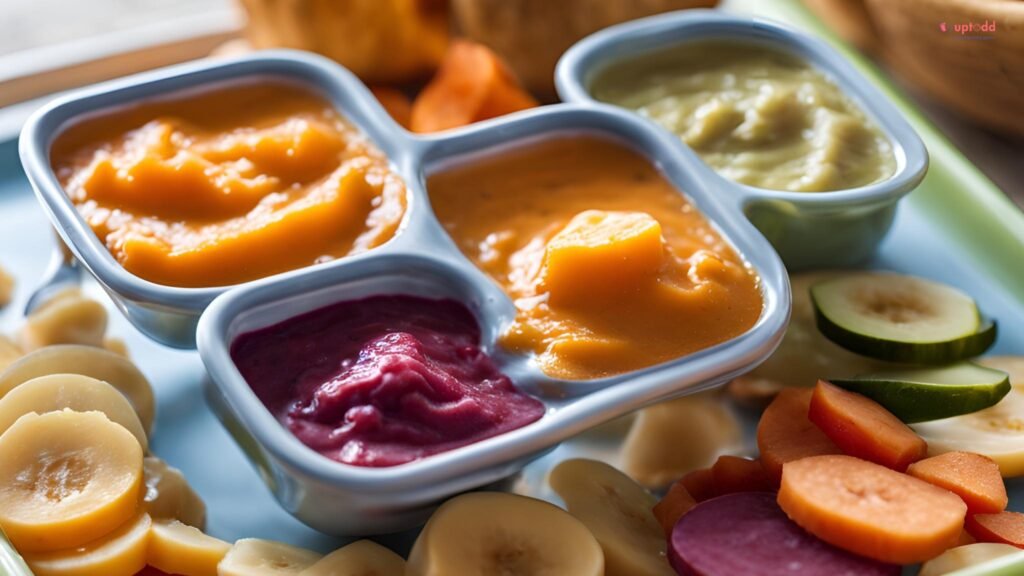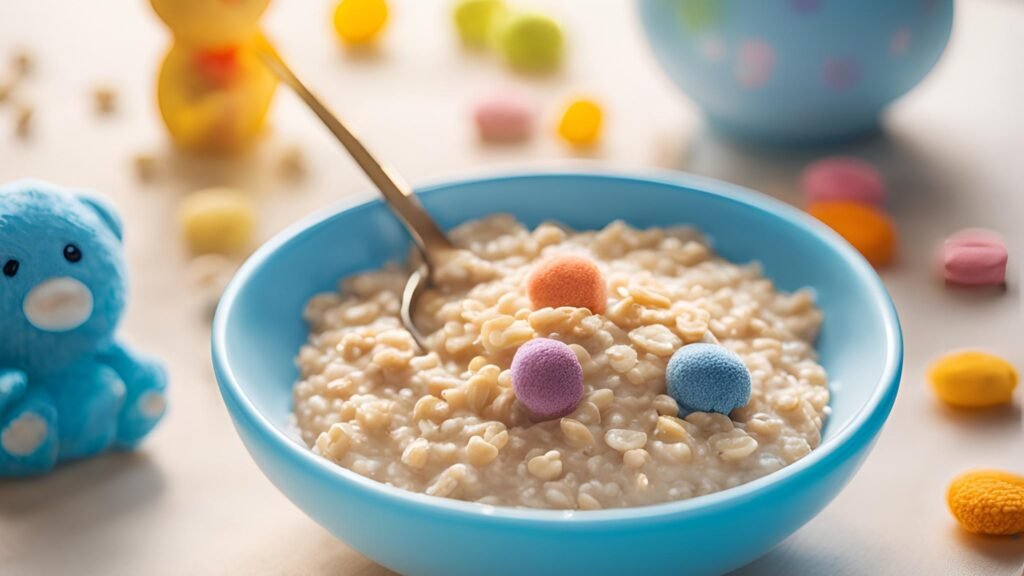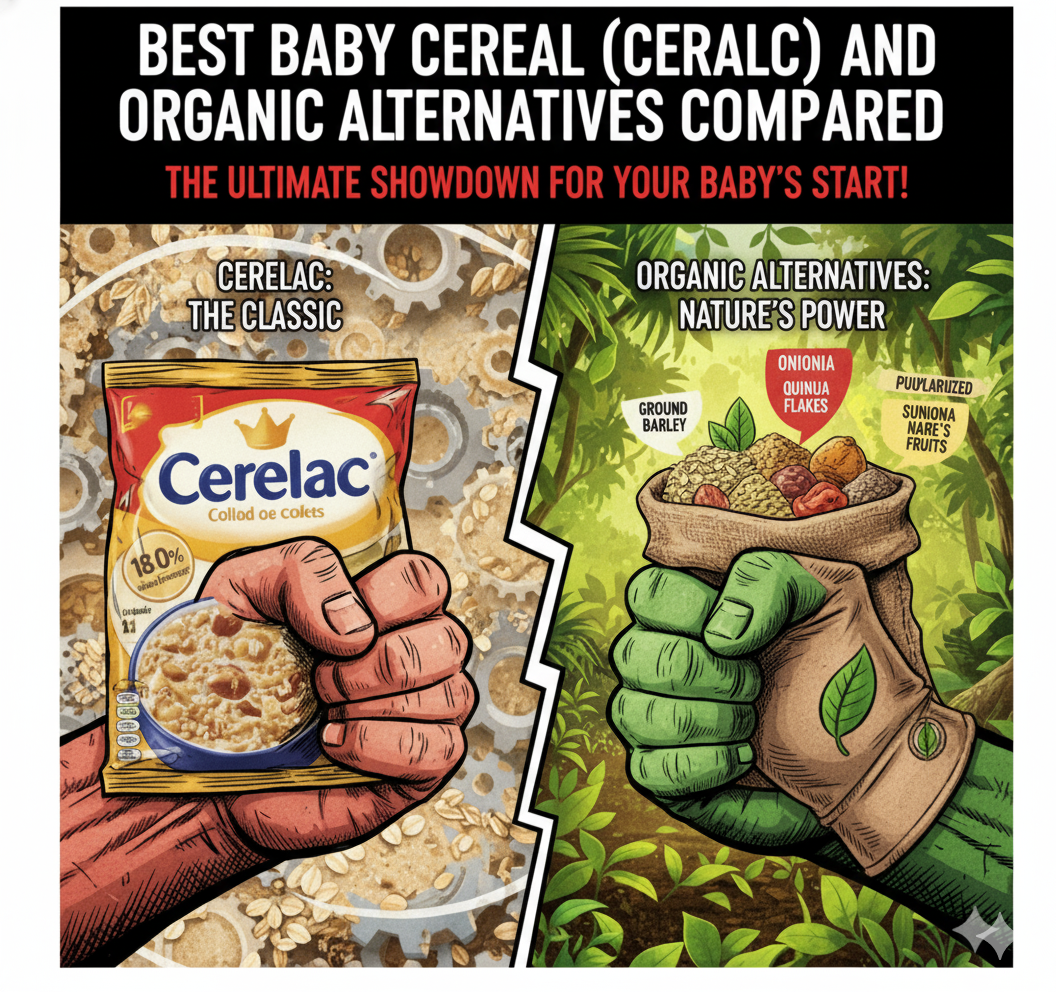
6 month baby food chart : Introducing Solids
Topic
6 month baby food chart : Introducing Solids
May start as early as
6 months
─────────
We have curated 6 month baby food chart for your baby in this blog.. When our baby turns 6 months we fear what to feed them. Most babies start solids around 6 months. Begin with iron-rich foods (dal, ragi, meats, iron-fortified cereal) in smooth textures, 1–2 small meals and increase variety. Keep breastmilk/formula as the main nutrition. Introduce allergens(peanut, egg, dairy) in safe forms during the first year. Avoid honey, excess salt, and whole nuts; give small sips of water with meals. Watch for choking, seat baby upright, and add new foods one at a time. (In Hindi – Ghar Ka khana)
The American Academy of Pediatrics and the Dietary Guidelines for Americans recommend that children begin eating meals other than breast milk or infant formula around the age of six months. Before this age they should not be given anything except breastmilk or formula milk. For healthy brain growth, see our list of brain foods for 6 month olds, you should follow nutrition guide carefully and consistent.
FREE 6 Month Baby Food App – DOWNLOAD NOW
In this blog we will cover-
- Why solids should not be given before 6 months
- Nutritional Requirements at 6 months
- Food Chart- For 6 month baby food
- Precautions to take while introducing solids

Uptodd baby cereal is Live Now!!
Why solids should not be given before 6 month baby?
There are various reasons why you should not provide solid foods to your infant until they reach six months of age:
Physical Readiness
Before the age of six months, babies are physically incapable of digesting food. Their digestive tract is still developing, and they do not begin manufacturing digestive enzymes until approximately six months.
Risk of illness
Introducing solid foods before six months of age increases the risk of illnesses such as diarrhea, which can cause your infant to become weak and skinny.
Risk of food allergies
Introducing solid foods before six months can raise your baby’s risk of developing food allergies.
Risk of choking
Because of the tongue thrust reflex, babies under the age of six months may have difficulty swallowing solid foods.
Breastmilk is the safest food.
Breast milk is the safest and healthiest meal for babies in their first six months. It provides a consistent source of nutrition, and breastfeeding has additional benefits for the parent.

Signs that your infant is ready for solids include
- They can sit without support.
- They are interested in food and observe you eating.
- They can reach out and grab things.
Diet Chart – 6 month baby food chart
At this age of your baby’s life following a strict diet chart is at times very difficult. But still we have a sample diet plan for you little one so that time gaps can be noticed and your baby is not over or under fed.
Refer to methods on How to start food for 6 months baby
| Time | Meal | Details |
| 6:30 AM | Breastfeed or Formula | Begin the day with a full feed to provide hydration and energy. |
| 8:30 AM | Breastfeed or Formula | A second milk feed to maintain nutrition. |
| 12:30 PM | Use anyone of the following : Start with rice dal water then iron-fortified cereal, mashed dal/khichdi with ghee, ragi porridge, pureed meats/egg yolk, yogurt + fruit, tofu/legume purees | Offer 2–3 teaspoons of the material. Gradually increase the quantity. |
| 12:30 PM | Breastfeed or Formula | A milk feed to continue meeting their primary nutritional needs. |
| 3:00 PM | Breastfeed or Formula | Another milk session to keep them hydrated and nourished. |
| 5:30 PM | Use anyone of the following : Start with rice dal water then iron-fortified cereal, mashed dal/khichdi with ghee, ragi porridge, pureed meats/egg yolk, yogurt + fruit, tofu/legume purees | Offer 2–3 teaspoons of the material. Gradually increase the quantity. |
| 7:30 PM | Breastfeed or Formula | Provide a milk feed before bedtime to ensure comfort and nutrition. |
| 10:00 PM | Breastfeed or Formula | Offer another feed to keep them full through the night. |
| Overnight | Breastfeed (1–2 times, as needed) | Feed on demand during the night to address hunger and ensure hydration. |

Once your little one is adjusting well to rice water and dal water then in next 1-2 weeks you can introduce other options. This will ensure nutritional needs are met for your baby. Begin with these nutrient-rich options:
- Sweet potato
- Carrots
- Green beans
- Peas
- Pumpkin puree and other suggested items in chart
Always adjust the consistency of these purees by adding a little amount of water or formula milk.
Know about how much quantity food is good for 6 month old baby
Understanding Your 6 Month Baby Nutritional Needs
At six months, babies require certain nutrients for maximum growth. Here are the important nutrients.
- Iron: Critical for brain development and oxygen transportation.
- Protein: It is vital for tissue growth and repair.
- Zinc supports immune system function.
- Vitamins A, C, and D are essential for vision, immunity, and bone health.
- Healthy fats are important for brain development.
If your concern is baby weight, then check our guide on weight gain foods for babies
Precautions to take while introducing solids to 6 month baby
- Wait until your baby is 6 months old, as suggested by the WHO.
- Ensure that your infant exhibits readiness signals such as sitting with support, adequate neck control, and an interest in feeding.
- Begin with single-ingredient foods to rule out any adverse responses.
- Begin with tiny dosages (1-2 tablespoons) once a day, gradually increasing as the infant adjusts.
- Introduce a new food every 3-5 days to check for allergies or sensitivities such rashes, diarrhea, or vomiting.
- Do not serve nuts, whole grapes, popcorn, hard sweets, or huge chunks of raw fruits and vegetables.
- Eliminate salt, sugar, and processed meals to protect the baby’s kidneys and develop healthy eating habits.
- To lessen the danger of choking, ensure your infant sits upright in a high chair or supported position.
Frequently Asked Questions
1. What first foods are best in Indian diets? iron rich + vitamin c
At around six months, babies are usually ready for pureed or mashed solids. Start with iron-rich foods (like mashed moong dal, pureed spinach, fortified cereals, mashed egg yolk) paired with vitamin C foods (like mashed papaya, guava, or a squeeze of lemon) to boost absorption. You can also introduce soft khichdi, mashed sweet potato, and well-cooked carrots as early options.
2. How often should a 6 month old eat solid food?
New recommendations suggest starting with two to three small meals a day for infants aged 6–8 months, along with continued breastmilk or formula.
3. How do I prevent and monitor food allergies?
Introduce one new food at a time and wait 2–3 days before introducing another to watch for allergies like rash, vomiting, or diarrhea. Delay complex mixtures until simple ones are tolerated
4. What textures are best for this stage?
Begin with smooth, thin purees. As your baby’s eating skills improve, gradually move to thicker purees and eventually soft finger foods by 7–8 months.
5. How much breastmilk or formula should I continue?
Breastmilk or formula remains the main nutrition source until about 12 months. Solids initially complement—not replace—liquid feeds. You can offer additional liquids like breastmilk mixed with rice or dal water
6. Are commercial baby foods okay to use?
Commercial baby foods are acceptable if used properly, but homemade purees offer more control over ingredients. Ensure hygiene and avoid added salt or sugar.
7. What nutrients are most important at six months?
Iron-rich foods (e.g. fortified cereals, dal) and healthy fats (e.g. avocado) are essential. Babies also need vitamins like A, D, C and minerals for growth and brain development
8. When should solids replace milk feeds?
Solid meals gradually increase by 9–12 months. Solids don’t fully replace breastmilk or formula until after one year, but by 9 months, many babies begin eating 3–4 small meals plus 1–2 snacks daily.
9. What common mistakes should parents avoid?
- Starting solids before 4 months (increases choking and allergy risk)
- Adding salt, sugar, or too much spice
- Introducing many new foods at once
- Offering inappropriate textures (e.g. grapes, raw hard vegetables)
10. When to start solids? (~6 months)?
Most babies are ready for solids around 6 months of age. Look for signs like sitting with support, showing interest in food, and losing the tongue-thrust reflex. The World Health Organization and Indian Academy of Pediatrics both recommend exclusive breastfeeding until 6 months, followed by gradual solid food introduction.
11. Is honey safe?
No, honey is not safe for babies under 12 months. It can carry spores that cause infant botulism, a rare but serious illness. Even “processed” or “organic” honey should be avoided until after the first birthday.
Research & Resources
- https://www.mayoclinic.org/healthy-lifestyle/infant-and-toddler-health/in-depth/healthy-baby/art-20046200
- https://www.who.int/publications/i/item/9789240081864
- https://www.aap.org/en/patient-care/healthy-active-living-for-families/infant-food-and-feeding/
- https://www.cdc.gov/infant-toddler-nutrition/breastfeeding/weaning.html






